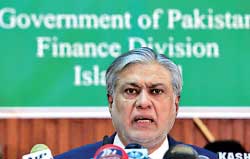Sunday Feb 22, 2026
Sunday Feb 22, 2026
Monday, 29 May 2017 00:03 - - {{hitsCtrl.values.hits}}
 ISLAMABAD (Reuters): Pakistan will lower corporate taxes and step up agricultural subsidies and loans to boost growth in the financial year from July, Finance Minister Ishaq Dar said on Friday, outlining the plans in a final budget before elections in 2018.
ISLAMABAD (Reuters): Pakistan will lower corporate taxes and step up agricultural subsidies and loans to boost growth in the financial year from July, Finance Minister Ishaq Dar said on Friday, outlining the plans in a final budget before elections in 2018.
Pakistan’s economy has rebounded in recent years, helped by improving security, low global oil prices and vast Chinese investment that is helping alleviate energy shortages.
Growth hit an estimated 5.3% in the year to July – short of the government’s 5.7% target but the fastest rate since 2007 as agriculture output rose and the industrial and service sectors performed steadily.
Dar said the government’s focus for the 2017/2018 financial year would be to boost growth, hoping to capitalise on greater economic stability in the last few years.
“It’s our number one priority,” said Dar, who has been credited with steering the economy through a turbulent 2013 when Pakistan sought IMF loans to alleviate a balance of payments crisis.
Dar said corporate tax rate would be trimmed to 30%, shaving about 100 basis points from the old rate, while agricultural subsidies announced last year would be continued.
He also promised a new loan scheme for farmers at reduced interest rates, likely to go down well with rural voters ahead of the next polls expected before June 2018, and promised to reduce taxes on a commonly used fertiliser.
Dar set a growth target of 6% for next year, which experts say is the minimum level needed for Pakistan to absorb new entrants to the workforce in a fast-growing population of nearly 200 million.
Dar also announced a rise in the minimum wage and a one-off payment for soldiers and civil servants. The federal government’s public sector development programme is due to be increased by 25%.
Conflicting numbers
With the IMF’s three-year loan program having ended in September 2016, there had been speculation Prime Minister Nawaz Sharif’s government would loosen the purse strings before the next poll.
Dar said the ruling PML-N party would maintain economic stability, forecasting the budget deficit would narrow to 4.1% in 2017/18 from the 4.2% estimated for the current year.
“By keeping the current expenditure under tight control, we will be able to create substantial space for development,” Dar said.
The finance ministry in its Annual Budget Statement said Pakistan’s total expenditure for next financial year would increase by about 4% to 5.2 trillion rupees ($50 billion).
Dar, in his speech, said the federal budget outlay would increase 11.7% to 4.75 trillion rupees. Various documents provided to journalists by the ministry showed slightly different figures.
Paying for the boost in spending, Dar expects record tax inflows of 13.7% of GDP in the $300 billion economy.
He announced a hike on dividend tax rates, from 12.5% to 15%.
Pakistan has one of the world’s lowest number of taxpayers as a percentage of the population, and Dar offered various incentives for citizens to become part of the tax net, including setting capital gains tax at 15% for filers and 20% for non-filers.